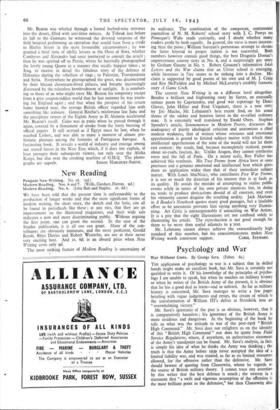Penguin New Writing. No. 16. (9d.)
New Reading
Modern Reading. Nos: 6 and 7. (Wells, Gardner, Darton. 9d.) Modern Reading. No. 6. (John Bale and Staples. zs. 6d.)
WE have been told that the present time is unfavourable to the production of longer works and that the most significant forms of modern writing, the short story, the sketch and the lyric, can all be found in periodicals like these ; at any rate, that they are an improvement on the illustrated magazines, and their wide sale indicates a new and more discriminating public. Without arguing the first point, one can grant the second. In the case of the Staples publication, it is all one can grant. Many of the con- tributors are obviously immature, and the more proficient, Gerald Kersh, Rhys Davies and Robert Westerby, are not at their never very exciting best. And 2s. 6d. is an absurd price when New Writing costs only 9d.
The most striking feature of Modern Reading is uncertainty of •
its audience. The combination of the competent, sentimental journalism of N. M. Roberts' school story with J. C. Powys on Finnegan's Wake reads curiously, and I doubt whether many readers profit by both equally. In general, the verse is more interest- ing than the prose; William Saroyan's portentous attempt to elevate the latter beyond its proper station is not successful. Both numbers however contain good things, the best Dragutin Doniac's unpretentious convoy story in No. 6, and a surprisingly gay story by Graham Greene in No. 7. Robert Greacen's informative Irish Letters and the War claims that an Ulster school is emerging, while literature in Eire seems to be sinking into a decline. His claim is supported by good poems of his own and of M. J. Craig and Roy McFadden and by Michael McLaverty's credibly fantastic story A Game Cock.
The current New Writing is on a different level altogether. Besides a brilliant and frightening story by Sartre, an unusually serious poem by Capetanakis, and good war reportage by Denis Glover, John Hillier and Fred Urquhart, there is a new story by Jiri Mucha, Mr. Lehmann's best recent find, on his usual theme of the oddity and heroism latent in the so-called ordinary man. It is extremely well translated by Ewald Osers. Stephen Spender's article, Sensuousness in Modern Poetry, discusses the inadequacy of purely ideological criticism and anatomises a chief modern weakness, that of writers whose sensuous and emotional apprehension is geared to limited subject matter with which their intellectual apprehension of the state of the world will not let them rest content: the result, bad, because incompletely realised, poems about air-raids, fascism, &c. Unlike Aragon, they cannot synthesise roses and the fall of Paris. On a minor scale, Roy Fuller has achieved this synthesis. His Two Poems from Africa have at once precision and a genuine emotional and intellectual heat which gives them an application wider than that of their immediate subject matter. With Louis MacNeice, who contributes Five War Poems, it is not so much the direction of his interest that is at fault :pts its quality. He avoids the mistake of attempting to realise public events solely in terms of his own private emotions but, in doing so, tends to produce abstractions devoid of all emotion, and even his virtuosity cannot disguise the resulting aridity. Jack Marlowe in A Reader's Notebook quotes many good passages, bUt a laudable effort to be unesoteric prevents him saying anything very illumin- ating. Art Critic is unexceptionable if unexciting on War Artists. It is a pity that the eight illustrations are not confined solely to illustrating his article. The reproduction is not good enough for them to be more than useful adjuncts to a text.
Mr. Lehmann cannot always achieve the extraordinarily high standard of this number, but his conscientiousness makes New Writing worth consistent support. CAROL STEWART.


























 Previous page
Previous page